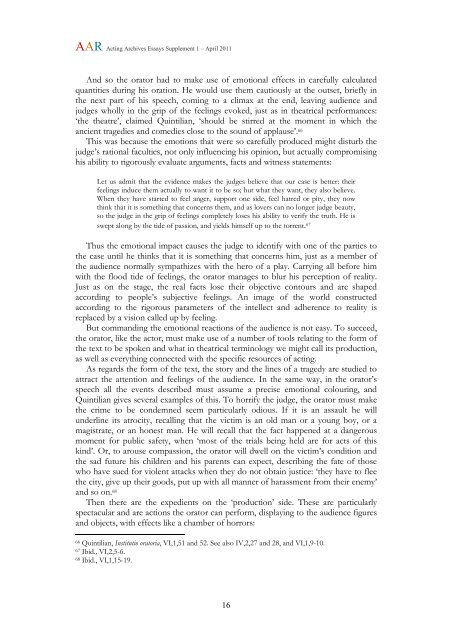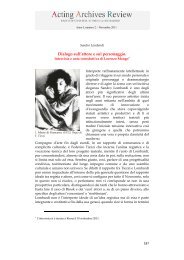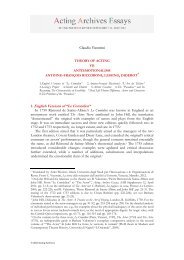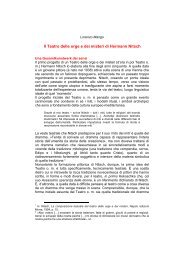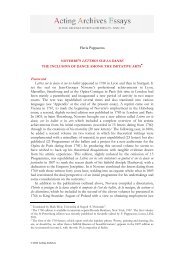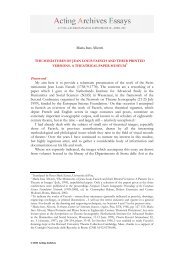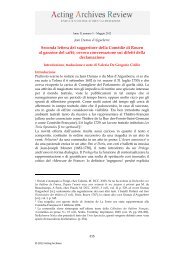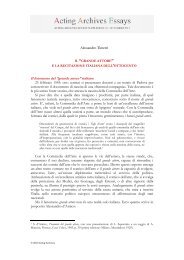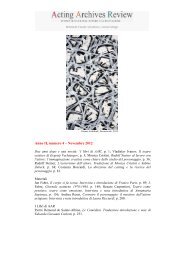Claudio Vicentini_Acting Theory in the Ancient World - Acting Archives
Claudio Vicentini_Acting Theory in the Ancient World - Acting Archives
Claudio Vicentini_Acting Theory in the Ancient World - Acting Archives
You also want an ePaper? Increase the reach of your titles
YUMPU automatically turns print PDFs into web optimized ePapers that Google loves.
AAR <strong>Act<strong>in</strong>g</strong> <strong>Archives</strong> Essays Supplement 1 – April 2011And so <strong>the</strong> orator had to make use of emotional effects <strong>in</strong> carefully calculatedquantities dur<strong>in</strong>g his oration. He would use <strong>the</strong>m cautiously at <strong>the</strong> outset, briefly <strong>in</strong><strong>the</strong> next part of his speech, com<strong>in</strong>g to a climax at <strong>the</strong> end, leav<strong>in</strong>g audience andjudges wholly <strong>in</strong> <strong>the</strong> grip of <strong>the</strong> feel<strong>in</strong>gs evoked, just as <strong>in</strong> <strong>the</strong>atrical performances:‘<strong>the</strong> <strong>the</strong>atre’, claimed Qu<strong>in</strong>tilian, ‘should be stirred at <strong>the</strong> moment <strong>in</strong> which <strong>the</strong>ancient tragedies and comedies close to <strong>the</strong> sound of applause’. 66This was because <strong>the</strong> emotions that were so carefully produced might disturb <strong>the</strong>judge’s rational faculties, not only <strong>in</strong>fluenc<strong>in</strong>g his op<strong>in</strong>ion, but actually compromis<strong>in</strong>ghis ability to rigorously evaluate arguments, facts and witness statements:Let us admit that <strong>the</strong> evidence makes <strong>the</strong> judges believe that our case is better: <strong>the</strong>irfeel<strong>in</strong>gs <strong>in</strong>duce <strong>the</strong>m actually to want it to be so; but what <strong>the</strong>y want, <strong>the</strong>y also believe.When <strong>the</strong>y have started to feel anger, support one side, feel hatred or pity, <strong>the</strong>y nowth<strong>in</strong>k that it is someth<strong>in</strong>g that concerns <strong>the</strong>m, and as lovers can no longer judge beauty,so <strong>the</strong> judge <strong>in</strong> <strong>the</strong> grip of feel<strong>in</strong>gs completely loses his ability to verify <strong>the</strong> truth. He isswept along by <strong>the</strong> tide of passion, and yields himself up to <strong>the</strong> torrent. 67Thus <strong>the</strong> emotional impact causes <strong>the</strong> judge to identify with one of <strong>the</strong> parties to<strong>the</strong> case until he th<strong>in</strong>ks that it is someth<strong>in</strong>g that concerns him, just as a member of<strong>the</strong> audience normally sympathizes with <strong>the</strong> hero of a play. Carry<strong>in</strong>g all before himwith <strong>the</strong> flood tide of feel<strong>in</strong>gs, <strong>the</strong> orator manages to blur his perception of reality.Just as on <strong>the</strong> stage, <strong>the</strong> real facts lose <strong>the</strong>ir objective contours and are shapedaccord<strong>in</strong>g to people’s subjective feel<strong>in</strong>gs. An image of <strong>the</strong> world constructedaccord<strong>in</strong>g to <strong>the</strong> rigorous parameters of <strong>the</strong> <strong>in</strong>tellect and adherence to reality isreplaced by a vision called up by feel<strong>in</strong>g.But command<strong>in</strong>g <strong>the</strong> emotional reactions of <strong>the</strong> audience is not easy. To succeed,<strong>the</strong> orator, like <strong>the</strong> actor, must make use of a number of tools relat<strong>in</strong>g to <strong>the</strong> form of<strong>the</strong> text to be spoken and what <strong>in</strong> <strong>the</strong>atrical term<strong>in</strong>ology we might call its production,as well as everyth<strong>in</strong>g connected with <strong>the</strong> specific resources of act<strong>in</strong>g.As regards <strong>the</strong> form of <strong>the</strong> text, <strong>the</strong> story and <strong>the</strong> l<strong>in</strong>es of a tragedy are studied toattract <strong>the</strong> attention and feel<strong>in</strong>gs of <strong>the</strong> audience. In <strong>the</strong> same way, <strong>in</strong> <strong>the</strong> orator’sspeech all <strong>the</strong> events described must assume a precise emotional colour<strong>in</strong>g, andQu<strong>in</strong>tilian gives several examples of this. To horrify <strong>the</strong> judge, <strong>the</strong> orator must make<strong>the</strong> crime to be condemned seem particularly odious. If it is an assault he willunderl<strong>in</strong>e its atrocity, recall<strong>in</strong>g that <strong>the</strong> victim is an old man or a young boy, or amagistrate, or an honest man. He will recall that <strong>the</strong> fact happened at a dangerousmoment for public safety, when ‘most of <strong>the</strong> trials be<strong>in</strong>g held are for acts of thisk<strong>in</strong>d’. Or, to arouse compassion, <strong>the</strong> orator will dwell on <strong>the</strong> victim’s condition and<strong>the</strong> sad future his children and his parents can expect, describ<strong>in</strong>g <strong>the</strong> fate of thosewho have sued for violent attacks when <strong>the</strong>y do not obta<strong>in</strong> justice: ‘<strong>the</strong>y have to flee<strong>the</strong> city, give up <strong>the</strong>ir goods, put up with all manner of harassment from <strong>the</strong>ir enemy’and so on. 68Then <strong>the</strong>re are <strong>the</strong> expedients on <strong>the</strong> ‘production’ side. These are particularlyspectacular and are actions <strong>the</strong> orator can perform, display<strong>in</strong>g to <strong>the</strong> audience figuresand objects, with effects like a chamber of horrors:66 Qu<strong>in</strong>tilian, Institutio oratoria, VI,1,51 and 52. See also IV,2,27 and 28, and VI,1,9-10.67 Ibid., VI,2,5-6.68 Ibid., VI,1,15-19.16


